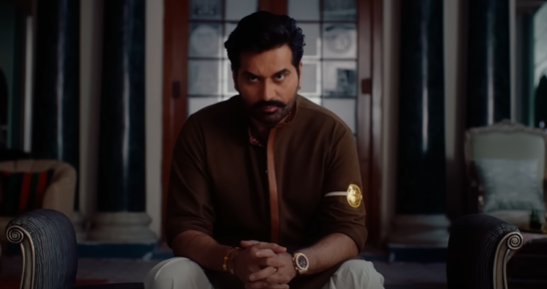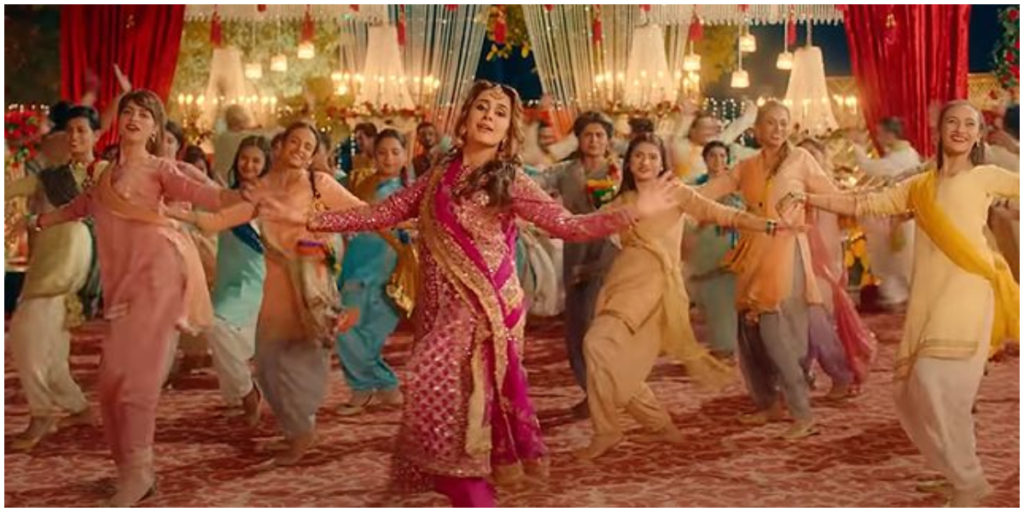
Nadeem Baig’s London Nahi Jaunga is ruling over the box office. With a business of 50 crores globally, the film is spreading its magic not only in Pakistan but worldwide. Starring Humayun Saeed, Mehwish Hayat, Kubra Khan, Gohar Rasheed, Saba Faisal, Iffat Omar and veterans like Sohail Ahmed, Salman Shahid and Asif Raza Mir, London Nahi Jaunga is a massive success and let’s find out why!
The film is a family entertainer yet it raises many questions about freedom of choice for women and answers a lot more. It is a film about a British girl Zara whose life take a turn when she reads her mother’s diary only to find that her father, Mansoor Jami, was brutally murdered under mysterious circumstance due to a love marriage. She returns to Punjab to meet her mother’s family and makes a plan to avenge her father’s death.
Here is what to look forward to in the film and what disappointed us:
THE GOOD
Humour
The most enjoyable aspect of LNJ is its humour. It is fresh, nuanced, subtle and relatable. Even if you’re not a Punjabi, you must have had familiar interactions with your extended family, friends or a neighbor. All the characters have a funny bone and their references are driven by pop-culture so you would take many memorable one-liners home, including affiliation with PTI, not even allowed to go to London even when you’re sick (PML-N), mean girls and so on.
Though it’s ironical but it seems like an intentional play on slaps; Chaudhry Jameel gets slapped three times, each by his mother, father and the heroine in the film.
Strong messages
London Nahi Jaunga is written by Khalil ur Rehman Qamar (hint: Chaudhry Jameel’s nom de plume in the film is Qamar). Fortunately, the film’s narrative doesn’t reflect what the writer has been known for i.e. sexist and misogynistic remarks. LNJ is quite a progressive story with strong messages about a woman’s right to choose, gender equality, and the society’s constant need to make everything about women a matter of honour. It is not saying anything new but reiterates what feminists have been saying for centuries. However, here the male protagonist lead the way without being preachy, giving it a subtle stamp of approval which perhaps will make men think twice.

The moment Jameel takes an oath ‘Mein London Nahi Jaunga’
A progressive story by KRQ
London Nahi Jaunga appears to be a sincere and thoughtful act of atonement by the infamous writer who has been vocal about his anti-feminist believes. His heroine in LNJ, Zara Mansoor is a strong-headed woman who has returned to avenge his father’s death who was killed in the name of family honour. She has a voice and agency; two most important things that are popularly missing in female leads of our stories.

Perhaps, this neo KRQ and his sensible messaging in the film is the reason behind Meesha Shafi’s YES to a song in a KRQ film, as well as Meesha’s mother Saba Hameed playing a significant role in it.
Humayun Saeed’s undeniable chemistry with everyone in the film
Humayun Saeed as Chaudhry Jameel is not doing anything extraordinary. His character is very much on the same scale as Fawad Khagga from Punjab Nahi Jaungi. But Humayun, with his undeniable charm and simplicity wins over all hearts. He is the only son of a feudal family that desperately wants him to marry his cousin Arzoo (Kubra Khan) but Jameel wants to marry a foreigner. Why? No one knows, perhaps that’s just his dream.

Jameel is surrounded by many people and each has their own unique sets of characteristics but Humayun’s on-screen chemistry with all of them is on fire. It is a rarity to enjoy every scene of a hero in a film and LNJ is that exception. Be it with his funny father Chaudhry Kafeel (Sohail Ahmed), his huqqa lover taya (Salman Shahid) or his typical Chaudhrayen mother (Saba Faisal), every conversation leads to laughters and giggles.

That’s not all, Jameel enjoys a great rapport with his goofy but supportive best friend Bhatti (Gohar Rasheed). Though it wasn’t always amicable, the scenes with heroine Zara Mansoor Jami (Mehwish Hayat) or her naive London friend Harry (Vasay Chaudhry) are also thoroughly entertaining.
Incredible performances
And that leads us to admit that the casting of LNJ is perfect. It is true that Sohail Ahmed has done this powerful Punjabi patriarch role for the umpteenth time in a film and more often than not he is his child’s best buddy (most recently in Dum Mastam). However, his presence feels like a must now. Saba Faisal’s decked up portrayal of a Punjabi mother is indeed lovable, including her snarky remarks.
Humayun and Mehwish are established names and they have already proved that the camera loves them together. This time, Kubra plays an educated girl from rural Punjab who is in love but still has a self esteem. Gohar plays the harmless sidekick. Both of their performances shine through and through, along with Vasay Chaudhry who nails his role as a charming friend.

Saba Hameed as Sara Tiwana feels like a force to be reckoned with. One can not over look the fact that LNJ features a new face of villain i.e. Asif Raza Mir; not our usual Shafqat Cheema and Nayyar Ejaz. However, his screen time was miniscule.
Read: London Nahi Jaunga beats Shamshera at UK box office
THE BAD
Predictable storyline
London Nahi Jaunga’s storyline is very predictable. After the first half an hour, you will see what is coming for the next few hours because it is loosely a modernized take on epic love tales like Mirza Sahiban. Once the conflict is out in the open, neither the heroine nor the film strives to keep its card hidden. There are no shocking moments and even the climax is predictable. But perhaps, this genre is meant to be to be told like that.
Stretched ending
If a film’s narrative doesn’t have any shock and awe value, it is best to play on its strengths i.e. amazing performances, great actors and gripping dialogue. There is no point in stretching its run time because that will eventually feel like a drag. Unfortunately, that is the case with LNJ as well. There is a lot of beating around the bush in the last half hour of the film, making the ending less crisp and delayed for a cine-goer.

Ordinary music
Unfortunately, the music of the film is not a hit. The songs come and go and are not very hum-worthy or drive the plot forward. Though Humayun has admitted it in his interviews, the Punjabi song where he sings and dances in London appears oddly discomforting because the song is totally out of sync. Same goes for a dialogue where they must have muted Tiwana. The only saving grace is Meesha’s Mahiya Ve Mahiya.

THE CONFUSING
Feminist statements 2.0
The film features many dialogues based on popular feminist statements. KRQ has somewhat tried to rebrand pop-culture slogans like mera jism meri marzi with tera thappar teri marzi. While it is a bold and an interesting choice, it is not one that sits well with everyone.
Puzzling relationships
The Tiwana gharana have relationships that are quite confusing to an average cine-goer. I was sitting in the last row and everyone around me was confused about who is related to whom and in what way. When Chaudhry Jameel calls the Pir (played by Asif Raza Mir) his Khalu [maternal uncle], I heard multiple voices hinting wasn’t he his phopha [paternal uncle]?
A word of advice, pay attention to the scene when Zara Mansoor listens to her parent’s doomed love story in the beginning.






The interface is quick deposits, and I enjoy using the API here.
Lee here — I’ve tried using the API and the easy onboarding impressed me.
The providing liquidity tools are scalable features and clear transparency. Perfect for both new and experienced traders.